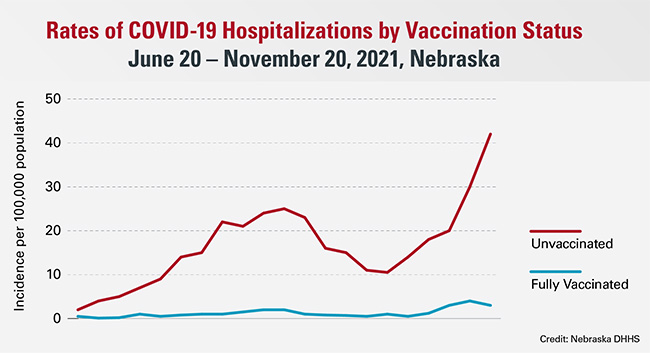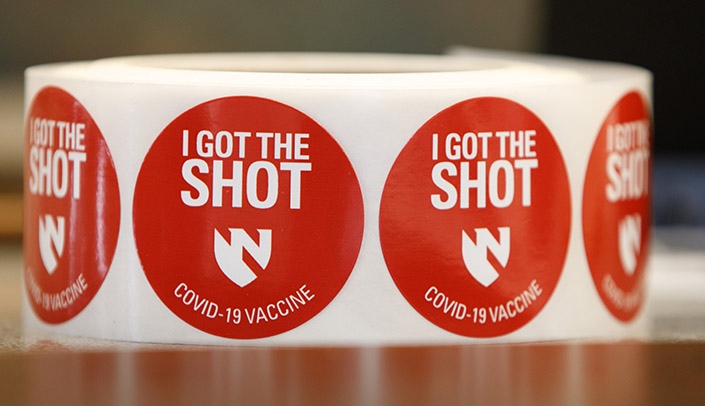 |
| Unvaccinated Nebraskans are leading the COVID-19 hospitalization surge. |
As COVID-19 patients again push hospitals to a critical point, metro area health systems stressed the urgency of the situation in hopes of reaching the large remaining numbers of unvaccinated people.
One target for their message: Young and unvaccinated adults, who are being hospitalized, experiencing longer-lasting effects, including scarring of the lungs, and even dying.
At a virtual press conference Wednesday, the health systems — including Nebraska Medicine — joined State of Nebraska health officials to highlight the heightened risks that the unvaccinated face from COVID-19.
Across Nebraska, COVID hospitalizations have reached a level not seen since last winter’s pandemic surge. But the rise stems from unvaccinated patients.
Since late October, unvaccinated Nebraskans have shown to be hospitalized with COVID-19 at a rate 10 times higher than the state’s vaccinated population.
"That means that vaccines work," said Matthew Donahue, MD, Nebraska’s acting state epidemiologist. "They work well. They're working here in Nebraska this month to keep people out of the hospital."
For unvaccinated people between the ages of 30 and 49, they are hospitalized with COVID at a rate equivalent to that of an 80-year-old with full vaccination.
Critical care doctors from Nebraska Medicine, CHI Health and Methodist Hospital said their ICUs are filling, if not full, with COVID patients.
Within that group, more patients in their 20s, 30s and 40s are experiencing severe COVID infections — going on ventilators, enduring permanent lung damage and dying, sometimes leaving behind families and children.
Brian Boer, MD, Nebraska Medicine’s section chief of critical care medicine, said the level of COVID hospitalizations is "crushing our health care systems, continuously."
Nebraska Medicine currently doesn’t take transfer patients from outside hospitals, Dr. Boer said, noting that burnt out staff members have left or retired from health care. The situation, he said, makes it more difficult to care for other hospital patients who don’t have COVID.
Dr. Boer said he knows some people will "stick with their guns" and not get vaccinated. But he asked vaccinated people to do whatever they can to convince friends to get vaccinated.
"We're all here," he said. "We’re in the fight. We just need you to do it too."
Adam Wells, MD, ICU medical director with Methodist Hospital, described the "despair and anguish" that families go through when their loved one needs to be intubated or dies from COVID.
Robert Plambeck, MD, ECMO director in critical care with CHI Health, said he’s seen younger patients who didn’t think they would get COVID. Then he’s had to talk with young patients about going on a ventilator, and witnessed their regret.
"They never thought they'd get to that point, and if they could go back, yeah, they'd get vaccinated. But at that point, it's too late."
Dr. Plambeck said it’s difficult to watch families suffering as a young parent leaves behind kids and a spouse.
"The sad thing is it didn't have to be that way," he said. "They could have they could have gotten vaccinated and not wound up in the ICU and dying on a ventilator."
Gary Anthone, MD, the state’s chief medical officer, said, "This is not something that people should take lightly.
"We are seeing this surge again, and we're concerned about what's going on. So the main message is please get vaccinated, please get boosted if you're eligible for a booster."
